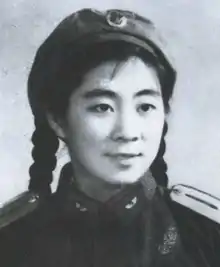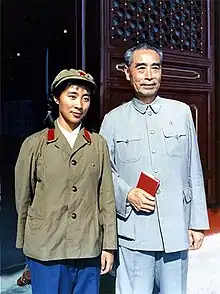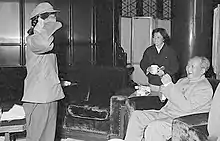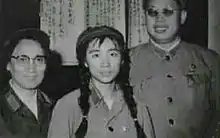Lin Liheng
Lin Liheng (Chinese: 林立衡; pinyin: Lín Lìhéng; born August 31, 1944) is the daughter of Lin Biao and Ye Qun, nicknamed "Dou Dou" (lit. bean bean) because Lin Biao loved eating beans.
Lin Liheng | |
|---|---|
 | |
| Born | August 31, 1944 |
| Alma mater | Tsinghua University Peking University |
| Political party | Communist Party of China |
| Parent(s) | Lin Biao, Ye Qun |
| Relatives | Lin Liguo (brother) |
Early life
Lin Liheng was born in Yan'an. She went with her father, Lin Biao, to Moscow when she was six years old. In 1962, she joined the Chinese Communist Youth League, and was admitted to the Department of Electronic Engineering of Tsinghua University. She was soon transferred to the Chinese Department of Peking University, due to health reasons. In 1965, she joined the Chinese Communist Party.
Cultural Revolution

During the Cultural Revolution, she served as deputy editor-in-chief of the magazine of People's Liberation Army Air Force.
After Lin Biao died in 1971 in the "Lin Biao Incident" (or "September-13th Incident", 九一三事件), Lin Liheng was investigated and put into custody by the government, even though she was the one that informed Zhou Enlai. In March 1974, during the Criticize Lin, Criticize Confucius campaign, Lin Liheng was characterized by the Gang of Four as "the nail left by Lin Biao".[1][2] At this time, she was suffering, and even attempted suicide by taking sleeping pills. She was rushed to an Air Force Hospital for medical treatment.[3] During her interrogation in custody, Lin Liheng lost half of her hair and six of her teeth. However, on Mao Zedong's orders, she was not further interrogated, and was released in 1974. In 1974, a Hong Kong newspaper published an colourful rumour that she had been murdered in revenge for betraying her father.[4]
Post-cultural revolution

In October 1975, then Chief of the General Staff of the People's Liberation Army Deng Xiaoping proposed to transfer Lin Liheng from the army to local work. She offered to go back to Beijing, but was rejected. Finally, he was arranged to an automobile factory in Zhengzhou, as section-level cadre-deputy director of the factory revolution committee. During her time in Zhengzhou, her movements were often restricted by the Ministry of Public Security. Following the fall of Deng Xiaoping in May 1976, Lin's position was downgraded to a factory worker. During the labor in factory, she was injured when she broke her phalanx bone in her right foot. She was to admitted to a hospital on 1984, after suffering from illness and allergies, due to exposure from the pesticide factory near her home.[5]
In the mid-1980s, Lin Liheng wrote a letter of appeal to Zhao Ziyang, then General Secretary of the Communist Party of China, in Beijing. With the help of Lin Biao's old subordinate, Tao Zhu's wife, Zeng Zhi, then deputy head of the Organization Department of the Central Committee, her letter of appeal was submitted. Soon, Zhao Ziyang gave orders which allowed her to be rehabilitated. As a result, Lin Liheng was allowed to return to Beijing.[6]

She later went to the Chinese Academy of Social Sciences in Beijing. After returning to Beijing, the couple's lives became comfortable, and as a result Lin Liheng changed her name briefly to avoid public attention. In 1989, she participated in the establishment of an organization called the "Chinese Modern Culture Association", and later established a corporate culture professional committee and an oral history professional committee under this organization. She retired in 2002.
Later life
After retirement, Lin Liheng opened a restaurant in Beijing, serving as its chairperson and general manager. The investment of the restaurant came from her hometown of Huanggang in Hubei Province, and managed to attract a large number of diners from home and abroad.[7]
In 2009, the Museum of the War of Chinese People's Resistance Against Japanese Aggression welcomed more than 80 children of the founding generals to celebrate the founding of People's Republic of China. Lin Liheng also attended the event. In 2011, during the Mid-Autumn Festival, she and her husband led an entourage to Öndörkhaan, the place where her father's plane crashed 40 years ago, for a memorial service honoring him.[8]
On 1 November 2014, she publicly appeared on a symposium of Chinese Red Army descendants and gave speeches; this attracted the media's attention, as she proposed to full respect of historical facts and for intensified efforts to unearth and sort out historical incidents.[9]
See also
References
- 林彪之女林立衡 揭“九一三”事件的真相(多图) - 史海钩沉 - 倍可亲
- 来自林彪女儿林立衡的报告 - 中国共产党新闻 - 人民网
- ""九一三"后的林立衡:遭到激烈批判,一度自杀". 人民网. 2012-09-14.
- Terrill, Ross. Mao: A Biography. Stanford University Press. p. 369. ISBN 978-0-8047-2921-5.
- 林彪的小女儿林豆豆,退休后隐姓埋名在北京开酒楼,生活很低调
- 林彪的小女儿林豆豆,退休后隐姓埋名在北京开酒楼,生活很低调
- 林彪的小女儿林豆豆,退休后隐姓埋名在北京开酒楼,生活很低调
- 此人是谁?林彪事件她功不可没,被审查时毛主席亲自解救,晚年善终!
- "近百名红二代在京座谈 林彪之女公开露面(图)". 新浪. 2014-11-06.
